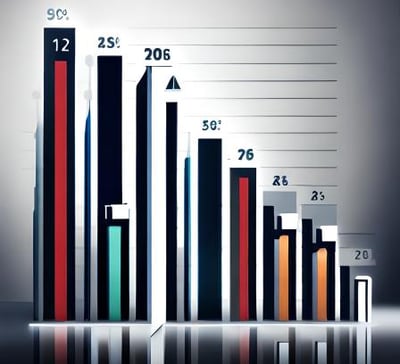Unlocking Wealth: Fractional Shares for Diverse Investing
Dive into the world of fractional share investing for a smarter way to build diversified wealth.
FINANCIAL MANAGEMENT


#3. Overcoming Investment Barriers
One of the most significant barriers to entry in the stock market is the cost of individual shares. High-value stocks often carry price tags that can be intimidating, especially for beginners. Fractional share investing eliminates this barrier, enabling you to invest in any company without worrying about the share price.
Making High-Value Stocks Accessible
Fractional shares bring high-value stocks within your reach. Whether it's a renowned tech giant or a leading consumer brand, you can participate in their success without needing a substantial upfront investment.
Using Fractional Shares to Create a Diverse Portfolio
A major tactic for controlling risk in a portfolio of investments is diversification. Even with a small amount of capital, fractional share investing gives you the ability to create a diversified portfolio. You may diversify risk and improve your prospects of consistent growth by spreading smaller sums of money across a variety of businesses and industries.
#4.The Power of Diversification
Diversification is often hailed as the cornerstone of successful investing. It involves spreading your investments across different assets to reduce the impact of a poor-performing investment on your overall portfolio. Fractional share investing takes this concept a step further by allowing you to diversify within individual companies.
Spreading Risk Through Fractional Ownership
Fractional ownership enables you to diversify within a single company by owning fractions of its shares. If a company you've invested in experiences a downturn, the impact on your portfolio is minimized compared to owning whole shares.
Exploring Different Asset Classes
Fractional share platforms are expanding beyond traditional stocks and into other asset classes like bonds, real estate, and commodities. This expansion allows you to diversify across different investment types, further reducing risk and enhancing potential returns.
#6. Selecting the Right Platform
As fractional share investing gains momentum, numerous investment platforms have emerged to cater to this growing demand. These platforms offer investors the opportunity to buy and trade fractional shares with ease. However, it's crucial to choose the right platform that aligns with your investment goals and preferences.
Popular Platforms Offering Fractional Shares
Several well-known investment platforms have integrated fractional share investing into their offerings, making it accessible to a broad audience. Some of these platforms include E*TRADE, Robinhood, and Fidelity. Each platform comes with its own set of features, fees, and user interfaces, so it's essential to research and compare before making a decision.
Factors to Consider When Choosing
When selecting a platform for fractional share investing, consider the following factors:
· Fees and Commissions: Different platforms may charge varying fees for fractional share transactions. Compare trading fees, account maintenance costs, and any additional charges that might affect your overall returns.
· User-Friendly Interface: A user-friendly platform interface enhances your investment experience. Look for platforms with intuitive navigation and clear investment options.
· Educational Resources: Platforms that offer educational resources such as articles, videos, and webinars can be beneficial, especially for beginners looking to learn more about fractional share investing.
#7. Strategies for Success
Successfully navigating the world of fractional share investing requires strategic thinking and a well-defined approach. Two key strategies that can contribute to your success are dollar-cost averaging and incorporating fractional exchange-traded funds (ETFs).
Fractional shares and Dollar-Cost Averaging
Regardless of the state of the market, you can invest a set sum of money at regular periods using the dollar-cost averaging approach. Long-term gains from this strategy may be more steady and help you avoid the dangers of trying to time the market. Because you may invest tiny sums frequently without going broke, fractional shares are ideal for dollar-cost averaging.
Incorporating Fractional ETFs for Instant Diversification
Exchange-traded funds (ETFs) are investment funds that trade on stock exchanges and hold a diverse collection of assets, such as stocks, bonds, or commodities. Fractional ETFs offer the benefits of diversification and instant exposure to multiple assets within a single investment. This can be particularly useful for investors seeking broad market exposure without the need to purchase multiple individual stocks or assets.
#8. Tax Implications and Reporting
As with any form of investment, fractional share investing has tax implications that investors should be aware of. It's essential to understand the tax treatment of fractional share gains and dividends to ensure you comply with tax regulations and make informed decisions.
Understanding Tax Treatment of Fractional Gains
The tax treatment of fractional share gains depends on various factors, including your country's tax laws and your individual financial circumstances. Generally, capital gains tax applies when you sell fractional shares at a profit. Keep accurate records of your transactions to facilitate accurate reporting during tax filing season.
Keeping Accurate Records
Maintaining accurate records of your fractional share transactions is crucial for tax reporting purposes. Digital platforms often provide transaction histories, but it's a good practice to keep additional records of your trades, including dates, transaction amounts, and any associated fees.
#9. Embracing the Future with Crypto
Fractional share investing isn't limited to traditional stocks; it's also extending into the realm of cryptocurrency. As the popularity of cryptocurrencies continues to grow, fractional ownership offers a more accessible entry point into the world of digital assets.
Fractional Ownership in Cryptocurrencies
Cryptocurrencies like Bitcoin and Ethereum are known for their high prices, which can be a barrier for some investors. Fractional ownership allows you to invest smaller amounts in these digital currencies, providing exposure to the potential growth of the cryptocurrency market.
Balancing Risk and Potential Rewards
It's important to note that the cryptocurrency market is known for its high volatility. While fractional ownership makes it easier to invest, it's crucial to research and understand the risks associated with cryptocurrency investments. As with any investment, consider your risk tolerance and investment objectives before diving into the world of fractional cryptocurrency ownership.
#10. Risks and Things to Consider
While investing in fractional shares has many advantages, there are also hazards and things to keep in mind. Observe the following elements:
How to Manage Market Volatility
Fractional share investments are no different from other investments in that they all include some level of risk. The value of your fractional shares may be impacted by big swings in the stock market. It's critical to keep a long-term view and avoid making snap decisions solely on the immediate.
Research and Informed Decision-Making
As with any investment, knowledge is power. Before investing in fractional shares, take the time to research the companies you're interested in, understand their financial health, and evaluate their growth potential. Informed decision-making can help you build a resilient portfolio that aligns with your financial goals.
#11. Investing Ethically with Fractional Shares
The concept of ethical investing is gaining traction, with more investors seeking to align their portfolios with their values. Fractional share investing provides a platform to invest in companies that prioritize environmental, social, and governance (ESG) criteria.
Integrating Environmental, Social, and Governance (ESG) Criteria
ESG criteria encompass a range of factors that measure a company's sustainability and societal impact. By investing in companies that excel in ESG practices, you're not only seeking financial returns but also supporting businesses that contribute positively to the world.
Supporting Sustainable Companies
Fractional share investing allows you to invest in companies that align with your values, whether it's renewable energy, social justice, or responsible governance. By directing your investment dollars towards sustainable businesses, you can play a role in driving positive change.
#12. Exploring International Markets
Fractional share investing isn't confined to domestic markets; it also offers opportunities to access international investments without the complexities associated with traditional cross-border trading.
Accessing Global Investments Through Fractional Shares
Investors can now access global markets and invest in companies listed on international exchanges through fractional shares. This provides exposure to diverse industries, economies, and geopolitical landscapes, expanding your investment horizons.
Seizing Opportunities Beyond Borders
Investing in international companies can provide unique growth opportunities that might not be available in your local market. Fractional shares make it feasible to invest in companies from different corners of the world, diversifying your portfolio and potentially enhancing your returns.


#13. Tracking and Managing Fractional Investments
As your fractional share portfolio grows, efficient tracking and management become paramount. Several tools and apps can help you monitor your investments and make informed decisions.
Tools and Apps for Monitoring Performance
Numerous investment platforms offer tools and apps that allow you to track the performance of your fractional share investments in real time. These apps provide insights into your portfolio's value, performance history, and sector allocation, helping you stay informed about your investments' progress.
Adjusting Portfolio as Needed
Regular portfolio reviews are essential to ensure that your investment strategy remains aligned with your goals. As your financial circumstances and investment objectives evolve, you might need to adjust your portfolio by rebalancing, adding new investments, or removing underperforming ones.
#15. Conclusion
Fractional share investing is transforming the way people invest, breaking down barriers and democratizing access to the financial markets. It offers an opportunity for investors of all backgrounds to build wealth, diversify their portfolios, and align their investments with their values. Whether you're a seasoned investor or just starting on your investment journey, fractional shares provide a smart path to achieving your financial goals.
# FAQs
1. What is a fractional share? A fractional share is a portion of a full share of stock, allowing investors to own smaller amounts of a company's stock.
2. How do fractional shares work? Fractional shares represent partial ownership in a stock. Instead of buying a whole share, you can invest in fractions, enabling you to invest in expensive stocks with limited funds.
3. Are fractional shares a new concept? No, fractional shares have been around for a while, but they've gained popularity recently due to fintech platforms offering them.
4. Where can I buy fractional shares? Many online brokerage platforms, like Robinhood, Charles Schwab, and Fidelity, offer the option to buy and trade fractional shares.
5. What's the benefit of investing in fractional shares? Fractional shares allow you to diversify your investments with smaller amounts of money and invest in high-priced stocks that might be otherwise inaccessible.
6. Can I receive dividends on fractional shares? Yes, you can receive dividends on fractional shares proportional to your ownership.
7. How are fractional shares priced? The price of a fractional share is proportionate to the full share's current market price.
8. Is there a minimum investment for fractional shares? The minimum investment varies by platform but can be as low as $1.
9. Are fractional shares safe to invest in? Investing in fractional shares is as safe as investing in whole shares, as they represent ownership in the same companies.
10. Can I sell my fractional shares? Yes, you can sell your fractional shares just like whole shares, subject to market conditions.
11. Do all companies offer fractional shares? Not all companies offer fractional shares; availability depends on the brokerage and the stocks they support.
12. Can I transfer fractional shares between brokers? Transferring fractional shares between brokers might be possible, but the process can be more complex than transferring whole shares.
13. How are stock splits handled with fractional shares? In a stock split, your fractional shares would be adjusted according to the split ratio.
14. Can I vote in shareholder meetings with fractional shares? Yes, fractional shareholders typically have the right to vote in proportion to their ownership.
15. Are fractional shares eligible for stock rewards, like IPO shares? This depends on the broker and the specific offering. Some might not offer such rewards for fractional shareholders.
16. Are fractional shares regulated? Yes, investing in fractional shares is regulated by securities laws like traditional shares.
17. Can I set up automatic investments with fractional shares? Many brokers allow you to set up recurring investments with fractional shares.
18. Are there fees associated with buying fractional shares? Some brokers might charge a small fee for executing fractional share trades.
19. How do I buy fractional shares? You can buy fractional shares through your chosen brokerage's trading platform.
20. Can I use fractional shares for long-term investing? Absolutely, fractional shares are suitable for both short-term and long-term investment strategies.
21. Are fractional shares available for ETFs (Exchange-Traded Funds)? Yes, many brokers offer fractional shares of ETFs as well.
22. Do fractional shares have any tax implications? Fractional shares can have tax implications, similar to those of whole shares. Consult a tax professional for guidance.
23. Can I purchase fractional shares in international companies? Some brokers might offer fractional shares in international companies, but availability can vary.
24. Do fractional shares expire? Fractional shares do not have an expiration date.
25. Is there a limit to how many fractional shares I can own? Theoretically, there's no limit, but practical limits might be imposed by brokers.
26. Can I use fractional shares for day trading? Yes, you can use fractional shares for day trading, but be mindful of associated fees and risks.
27. Are fractional shares eligible for margin trading? Some brokers might allow margin trading with fractional shares, but terms can vary.
28. Can I gift fractional shares? Some brokers offer gifting features that allow you to gift fractional shares to others.
29. How quickly can I buy/sell fractional shares? Fractional shares can be bought or sold in real-time during market hours.
30. What happens if a company goes bankrupt with my fractional shares? In case of bankruptcy, fractional shareholders are considered creditors and might receive a portion of remaining assets.
31. Can I use fractional shares in retirement accounts? Many brokers allow you to invest in fractional shares within retirement accounts like IRAs.
32. Are fractional shares suitable for beginner investors? Yes, fractional shares can be a great way for beginners to start investing with smaller amounts.
33. Can I transfer fractional shares to another person? Transferring fractional shares to another person might be possible, but brokers have different procedures.
34. Can I buy fractional shares of any stock I want? Availability depends on the stocks supported by your chosen brokerage.
35. How do brokers handle corporate actions with fractional shares? Brokers typically adjust fractional shares for corporate actions like mergers and acquisitions.
36. Can I get a certificate for my fractional shares? Fractional shares are usually held electronically, so physical certificates might not be issued.
37. Do fractional shares qualify for discounts in DRIP programs? Some brokers allow fractional shares to participate in Dividend Reinvestment Plans (DRIPs).
38. What's the difference between fractional shares and micro-investing apps? Micro-investing apps often use fractional shares as a way to invest small amounts automatically.
39. Can I use fractional shares for trading options? Using fractional shares for trading options might have limitations depending on the broker.
40. Are fractional shares influenced by after-hours trading? Fractional shares are generally traded during market hours and might not be influenced by after-hours trading.
41. Can I get a loan using my fractional shares as collateral? Some brokers offer the option to use fractional shares as collateral for loans.
42. Are fractional shares transferable upon death? Fractional shares are part of your estate and can be transferred according to your will or applicable laws.
43. How are fractional shares affected by stock buybacks? Fractional shareholders might have their fractional holdings bought back by the company in a buyback.
44. Can I set limit orders for fractional shares? Many brokers allow you to set limit orders for fractional shares.
45. Are fractional shares regulated differently in different countries? Regulations regarding fractional shares can vary between countries, but they're generally subject to local securities laws.
46. Can I convert fractional shares into whole shares? Some brokers might offer the option to convert accumulated fractional shares into whole shares.
47. How do I keep track of my fractional share investments? Brokers provide tools to track your fractional share investments within your account.
48. Can I use fractional shares for speculative trading? Yes, you can use fractional shares for speculative trading, but be aware of the risks involved.
49. Can I donate fractional shares to charity? Some brokers offer the ability to donate fractional shares to charitable organizations.
50. How do I choose a brokerage for investing in fractional shares? Consider factors like fees, supported stocks, user interface




